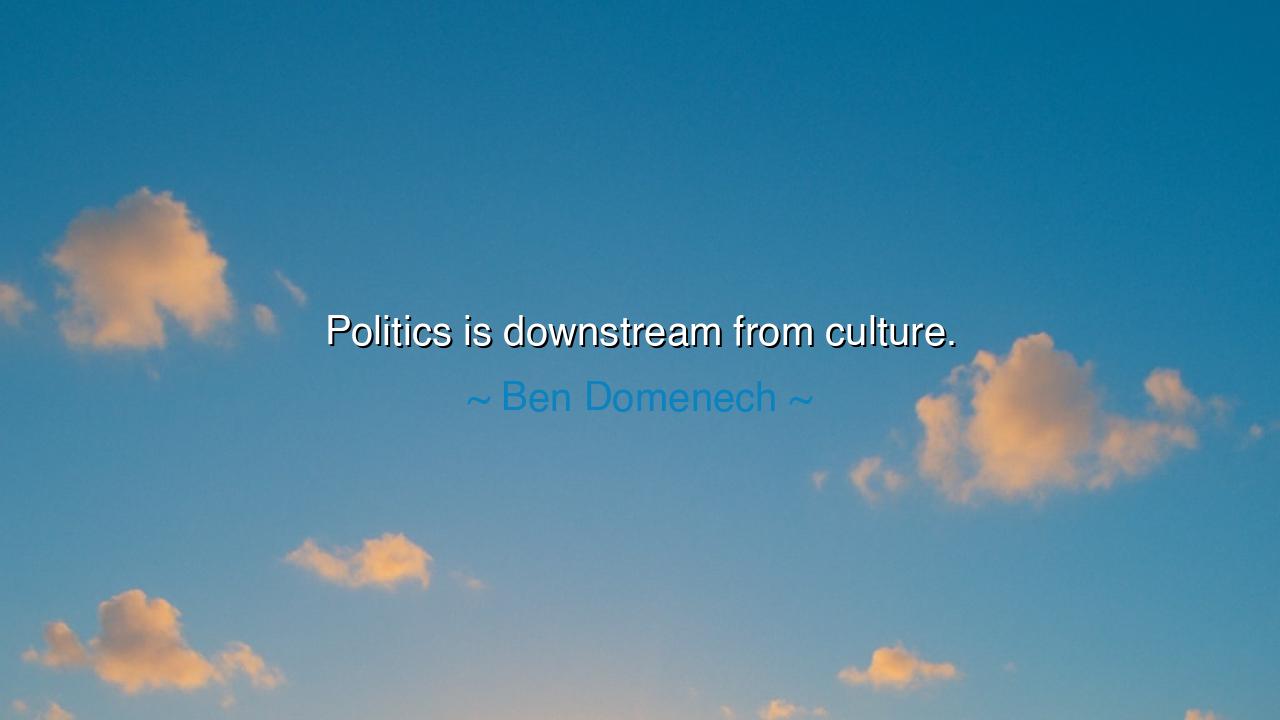
Politics is downstream from culture.






Hear, O seekers of wisdom, the flowing words of Ben Domenech: “Politics is downstream from culture.” In this utterance lies a vision of how societies are shaped—not by laws first, but by the beliefs, stories, and customs of the people. For politics is not the fountainhead, but the river’s mouth, carrying the waters that spring from the deeper soil of culture. What a people create in art, family, faith, and tradition will, in time, govern what they demand from their rulers.
For the culture of a people is their heart, and politics is but its echo. Leaders may pass decrees, but if the people’s spirit runs contrary, the laws will wither and die. Yet if culture shifts, politics must follow, for no government can stand long against the tide of its people’s values. Thus Domenech’s words remind us: the artist, the teacher, the parent, and the poet often shape destiny more deeply than the statesman or general.
History itself reveals this truth. Consider the civil rights movement in America: long before laws were changed, music, sermons, marches, and stories reshaped the culture. The songs sung in churches, the images of peaceful protestors enduring violence, transformed the conscience of a nation. From that cultural river came the laws of civil rights. Without the culture shifting first, the politics could not have followed.
So too in ancient days. The myths and philosophy of Athens—its poets, playwrights, and thinkers—nurtured a culture that made democracy possible. Politics did not invent freedom; rather, freedom sprang from the culture of open debate, theater, and philosophy. Likewise, in Rome, when the culture of decadence spread, the politics followed, sinking into corruption and collapse.
Therefore, O children of the future, take this lesson to heart: if you would change politics, labor first to change culture. Plant seeds in art, in education, in the stories you tell your children, for these will grow into the forests that shape laws and governments. Domenech’s words endure as both map and warning: politics is the river, but culture is the spring. If the source is poisoned, so too will be the stream. If the source is pure, the river will flow clear and strong.






LDLe Dang
It’s fascinating to consider politics as being downstream from culture, especially when you think about how societal values can shift and influence laws and policies. However, I wonder if this creates a chicken-and-egg situation. Can politics create cultural change, or are we always waiting for culture to lead the way? Is there a point where the relationship between the two is cyclical, and one cannot exist without the other?
BQLe Bao Quan
Domenech’s quote makes me think about how societal values are often reflected in politics, but I’m not sure if culture always dictates the political direction. Can politics, sometimes, drive cultural change? For instance, political leaders and movements can influence how a society thinks about issues like race, gender, or the economy. If politics is truly downstream from culture, can we have politics without first seeing cultural change in the masses?
HNHong Nguyen
I can see where Domenech is coming from, but I wonder if culture is always the primary influence on politics. Are there times when political decisions force cultural changes rather than the other way around? For example, think of landmark political decisions that later shape societal norms, like civil rights legislation or marriage equality. Could it be that politics can sometimes play a more active role in shaping culture?
NHNguyen Hien
Ben Domenech's statement that 'politics is downstream from culture' is interesting because it implies that the values, ideas, and norms of society shape political outcomes. If culture shifts, politics will follow. But does this mean that cultural movements always have the power to influence politics, or can politics still lead and shape culture? It makes me wonder if we should focus more on cultural change to drive political transformation.